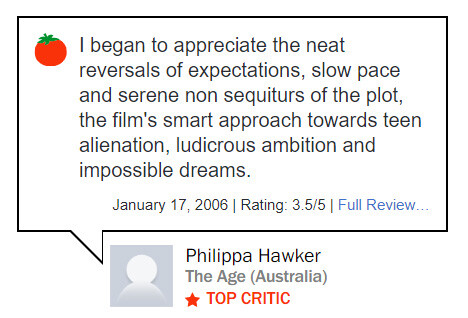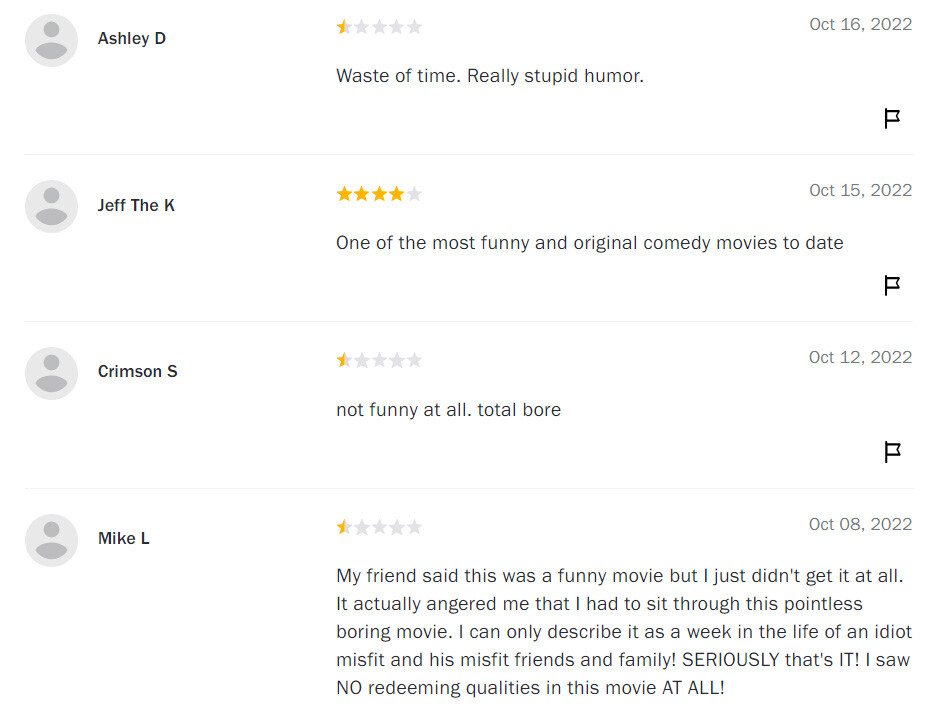That Time ‘Napoleon Dynamite’ Broke The Netflix Algorithm

Ah, Napoleon Dynamite — the movie that caused an entire generation to debate, at length, the merits of having “nunchuck skills.” It’s one of the most famous comedy films of the 21st century, with a current average critics score of 72% and an audience tally of 74% on Rotten Tomatoes. Which isn’t bad (it’s still regarded as “Fresh,” after all), but when you start looking at the many, many reviews of the movie where Jon Heder dances funny, it becomes obvious why this movie doesn’t have a higher rating. You might know this from arguing with your friends about it, but people have some polarizing views and divisive opinions about the indie film that keeps Etsy afloat thanks to it spawning a gazillion “Vote for Pedro” T-shirts.
Here’s a look at what critics had to say at the time:




Audiences, too, were either digging it or struggling to understand what the fuss (or, in the case of Heder’s hair, the fuzz) was about. Even today, a full 18 years later (cries), people are still divided on whether the movie about deadpan teenagers who dress like car salesmen is actually good or not.

The public’s inconclusive feedback on whether Napoleon Dynamite was banging or not proved quite the headache for folks trying to improve Netflix’s recommendation algorithm back in the days of Aughts. Netflix had started using algorithms as far back as the year 2000 to capture our interests and try and determine what we most likely wanted to watch. The first that the company used was called CineMatch, and it worked by using viewers’ movie ratings to predict a viewer’s favorability toward other movies. Former Netflix CPO Gibson Biddle explained the CineMatch algorithm as such: “Imagine I like Batman Begins and Breaking Bad, and you like both, too. Because I like Casino, the algorithm suggests you’ll like Casino. Now, apply this approach across millions of members and titles.”
According to Netflix, CineMatch could accurately predict user ratings within half a star 75% of the time. It was pretty impressive back then, but by 2006 the technology was starting to stagnate and, in keeping with their whole crowdfunding philosophy, Netflix turned to the public to help them push their prediction accuracy up by 10%. Called the Netflix Prize, the competition allowed anyone from around the world to compete against each other as they all tried to beat CineMatch for the grand prize of one million dollars, and uber bragging rights.
It was all going swimmingly for the top 10 teams on the leaderboard after one squad came up with the idea of implementing a mathematical technique called singular value decomposition, a strategy that resulted in a 4% higher accuracy rate over CineMatch. The technique determined “factors” or certain similar qualities within the 17,770 customer-rated movie catalog — like which movies were also considered “chick flicks,” or which films saw Tom Hanks star in a comedy — and grouped these movies together according to these factors. Other observations started happening, too. For instance, the algorithm determined that people who were into Sleepless in Seattle and Julia Roberts rom-coms were unlikely to favor Star Trek. The prediction rates started to rise, with teams coming close to the target at almost 9% …but then Napoleon Dynamite stopped everyone in their tracks.
Independent filmmaking in the United States had a slow rise at first, but was greatly helped by the Independent Cinema movement born from the Sundance Film Festival’s re-establishment in 1991. By 2005, 15% of domestic box office revenue was coming from independent studios. However, while Kevin Smith stories and Quentin Tarantino talkies managed to garner cult status, not everyone was feeling this new wave of daring and, oftentimes, quirky characters and their stories. Over on Netflix, Napoleon Dynamite shot up in popularity upon its release, but no algorithm seemed able to figure out the kind of people who would want to watch it. While algorithms could predict how people would rate Lethal Weapon within eight-tenths of a star, they were off by an average of 1.2 stars when it came to the indie comedy that also features a Backstreet Boys dance number (we don't know if that matters, but it totally should).
Napoleon Dynamite was a headache for programmers trying to beat CineMatch because of the fact that it was so polarizing among folks. At the time, the film had been rated more than two million times on Netflix, but those ratings wildly swung from loving to loathing. Other movies that also proved to be rated all over the place (and therefore difficult to predict) were titles like I Heart Huckabees, Lost in Translation, Kill Bill: Volume 1, and Sideways — all indie titles.
It’s been pointed out that the reason the movie with all that hair was so difficult to predict was due to the fact that it had so many ratings, hence a greater margin of error. The fact remains, though, that people still seem to randomly rate this movie in madly different ways — it could well be that the word-of-mouth hype by some caused unreasonable expectations in others — which just goes to show that when it comes to human taste, no one can ever be too sure, not even the algorithms.
Zanandi is on Twitter.
Thumbnail: Paramount Pictures